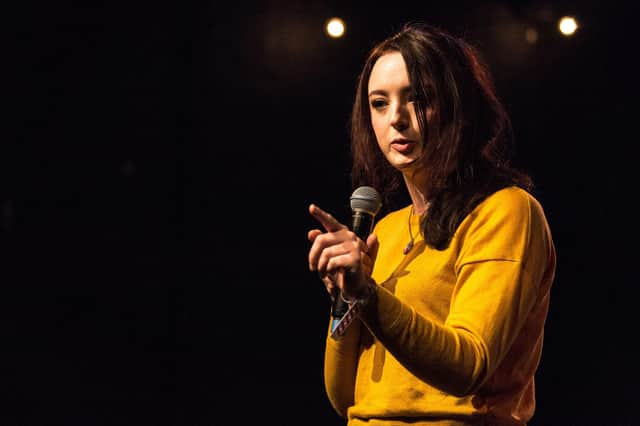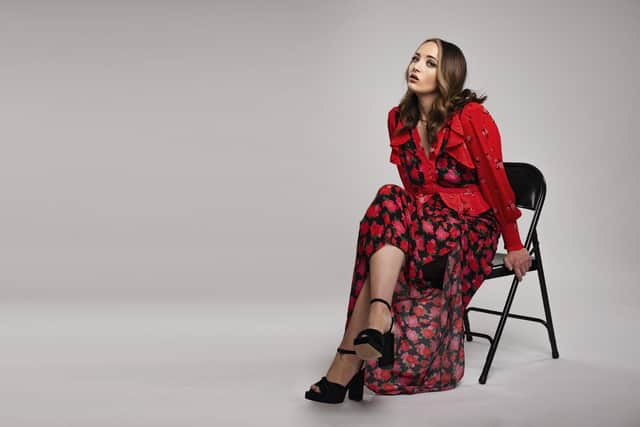Comedian Fern Brady hits the road to smash Scottish stereotypes


What does it mean to be British today? With indyref still on the agenda in Scotland and an increasingly diverse population spread across our islands, it’s time to look at the old stereotypes and see if they still apply. No wait! We can have a laugh while we do it, thanks to standup comedians Fern Brady, Darren Harriott and Ivo Graham.
Who better to undertake such a mission than the comic trio who spend their time on the road, performing in clubs and theatres the length and breadth of the country, getting up close with the people and opinions that are often by-passed by the metropolitan media?
Because comedians travel around so much you have a much more accurate view than most, says Brady, who was raised in Bathgate where her dad worked for a haulage company and her mum for Tesco. Now 34, after graduating in Arabic and Islamic History at Edinburgh University and editing the student newspaper, she moved into journalism where a story about trying out stand up saw finding her true calling and in 2010 and launching a comedy career that has seen her reached the finals of "So You Think You're Funny" at the 2011 Fringe and appear on 8 Out Of 10 Cats, Live at the Apollo and Frankie Boyle's New World Order.
“Everywhere you go, people speak in generalities, saying ‘I suppose everywhere has its good parts and its bad parts’, and that’s simply not true. Some places are an absolute bin fire and some places, if the audience hate you, they’ll let you know very gently.”
The result of the comic trio’s investigation is British as Folk, screening now on Dave, a light-hearted road-trip of the UKin which they explore and challenge regional stereotypes from Cornwall to the Highlands to discover what it means to be British in 2021. With Brady delivering her trademark dry wit, game for it Eton-boy Graham happy to have a laugh at his own expense and Londoner Harriott garrulous and game, they take on traditions, meet local legends and test their friendship.
Each of the six hour-long episodes focus on a different part of the UK and its stereotype, from ‘Is It Really Grim Up North?’ in East Yorkshire, to ‘Is The South All Style Over Substance?’ in Essex to ‘Do The Scots Really Hate The English?’ in Scotland.
“I was very, very nervous about the Scottish episode doing the stereotypes,” says Brady,” says Fern over Zoom from London, all deadpan delivery and drier than oatcake laugh. She lives there with her boyfriend and while lockdown put a stop to her hectic standup touring schedule, her popular podcast, Wheel of Misfortune with Alison Spittle continues to raise a laugh.


“I was worried about the Wales episode too as my next door neighbour is Welsh and I didn’t want him to be annoyed with me.”
She needn’t have worried. The stereotype of Glasgow, which Brady says is one of the most misjudged cities in the UK and “annoyingly still labelled as a dangerous, unwelcoming deep fried food mecca where you’re lucky to reach the age of 60” is well and truly thrown on its head. They meet by a vegan martial arts instructor, a yoga teaching painter and decorator, a celebrity barber born in The Congo and raised in Scotland and a ‘mad chef’ who turned his back on his addictions to focus on vegetables, all fighting the “Glasgow effect” where, to quote Brady “a quarter of men die before 65 and the rest look like sea monsters”. Balance this with its recent naming as the best place in Europe for vegans.
Throw in some Scottish survival skills - fighting with sticks, making a kilt from a piece of plaid and putting up a tent in Glen Coe, a close encounter with birds of prey and a paddle along the canal through Glasgow’s no-go to gentrified zones - and the stereotypes are buried in a shortbread tin along with the remains of the last wild haggis shot in the Highlands in Brigadoon kirkyard.
Fern was keen to avoid cliches, although the appearance of a Muncie box was allowed.


“It was stinking, and we got the biggest one ever for the show,” says Brady, “but, I suppose I do know people who eat them.”
As for hating the English, the ‘Mad Chef’ neatly bats rather than batters that one away by cunningly employing a cliche of his own - “I don’t have a view. Give me two glasses of Buckfast and then we’ll talk about it” - before returning to whipping up a fast vegetable ramen.
“I like spending time off in Glasgow,” says Brady. “I’ve no pals or family there but I love it and the show took me to places I’ve never been, like an amazing speciality tea house.”
A trip to the Birds of Prey Centre, however, wasn’t quite her cup of Ti Kuan Yin as Brady is paired with Ethan the hawk, not her first choice of raptor.


“Oh that was horrendous,” she laughs. “I was like, youse all think TV is gonna protect us from these birds, but I felt very on edge, like it was genuinely dangerous. ‘Cos none of they birds liked us,” she laughs.
“I wanted a go on the owl but there was a thing of he’s done his shift now and you have to have this hawk.”
It could have been worse, as Graham can be seen crouching when he has to offer his arm as a golden eagle perch.
“It was the size of a dog,” she says. “The guy that owned the birds had an air of the Tiger King, he was so proud he’d tamed this big eagle,” she says.
When the trio head up to Glen Coe to camp, despite Graham’s Duke of Edinburgh award and Brady’s claim of extensive tent experience, they wind up heading to a hotel for the night.
“Em, well I used to go on different kinds of camping,” she explains. “I went with my dad and brothers around rural bits of Scotland, never far up in the Highlands. And when I was a teenager I would go camping with my friends in West Lothian, because your parents thought it was a really innocent thing, but you were actually just going off to get drunk and stoned in the forest somewhere. So I had done it loads, but...”
She recalls another moment from the road trip, where our food heritage led to an insight into Scotland’s darker history.
“I’d brought Darren a load of Scottish cakes from my childhood, like Empire Biscuits, snowballs and pineapple tarts and he said ‘my Jamaican granny used to give us these. These aren’t Scottish,’ and I was like, ‘naw, naw these are Scottish.’ And then I started thinking when I was telling my boyfriend about it, ‘I don’t think they had coconut plantations in Scotland’, and we realised all the cakes are to do with slavery. Sugar, coconut and pineapples, and I’d never even thought of it. I’ve only learned about slavery in Scotland from seeing that Frankie Boyle travelogue [Frankie Boyle’s Tour of Scotland], because they didn’t teach it at my school.”
As well as the highlights, any road trips have a downside and for Brady this came in the form of having to speak to strangers, something that makes her uncomfortable.
“I know I do stand up but I find it really hard to approach strangers. The first episode I had to work on a market stall in Leicester and the woman running it acted as if I genuinely worked there and shouted at me loads. It reminded me of when I had to work in Boots in Bathgate and all the older women were just horrible bitches to me, so that was bad.
“And - this turned out to be one of my favourite bits in the show but at the time it was excruciating - I had to interview this surfer in Cornwall who’s about 80 and the first female surfing champion. I was really excited to meet this feminist hero and do an interview reflecting that but she just refused to take her ear plugs out so I had to keep repeating things and she kept saying ‘what?’. I asked if she’d ever dated a surfer and she went ‘my brother’. I don’t like watching clips of myself but it’s the only thing I’ve watched repeatedly because I can’t stop laughing.”
Maybe the octogenarian surfer will do the same when she sees the show and realises?
“I think she’ll still have her ear plugs in,” says Brady.
As for discovering what makes us British, did Brady and pals find any commonalities among the regions they visited, or was each distinct?
“I found everywhere different from everywhere else. For example Essex was very different to the stereotype. We didn’t do any cliched Essex stuff but we did do this thing called The Flitch Trials where couples from all over the world compete in a quiz to see how well they know each other. We entered as a throuple and Darren and I answered more questions right about each other but Ivo kept getting it wrong. It was quite dispiriting,” she laughs.
As well as busting stereotypes in Scotland Brady enjoyed exposing the myth of Essex girls in the county famed for fake tans, fillers and dumb blondes.
“We didn’t come across any stereotypes in terms of Towie or the women being all glammed up but we went to a place called Manningtree where an expert on witches told us where the Essex girls stereotype maybe comes from.
“It’s all to do with the word glamour. A glamour was a spell you put on people and comes from when working class women started wearing make-up rather than it just being the aristocracy. Because it’s a way of getting status unfairly, people had a problem with it and that’s how women ended up getting tried as witches. People would say ‘oh she’s put a spell on me and bewitched me with her looks’. It’s interesting to compare it to Love Island now where women have had a load of plastic surgery and people get annoyed about it, feel deceived, as if those women are getting a status that’s unfairly awarded. So yeah, I loved all the history of that.”
Accusing women of practising witchcraft wasn’t confined to Essex; there was plenty of that going on in Scotland, so maybe misogyny is something that makes us British?
“I’m obsessed with witches, really interested,” says Brady. “There’s a podcast called Witches of Scotland that I got into during lockdown where a Scottish writer and judge are trying to get pardons for witches: Women killed just for writing poetry, being slightly different, people with dementia, being horrible to your neighbour’s children, childless or just a grumpy old lady, anything that set you apart.”
And women who spoke out, or were funny, or as Brady is often called ‘blunt’.
“Yeah,” she says. “So I’ve got Asperger’s, or autism they call it now, and I’ve been thinking a lot about that; they definitely would have got rid of autistic women.”
This leads Brady into talking about the book deal she has just landed, to write her autobiography. She will talk about her early life and how she got into comedy and also about having autism, for which she has just got a diagnosis.
“I knew I had it when I first read about it at 16 but the understanding of how it presented in women was so limited then. It’s not like it presents so differently in women, it’s just that we are better at covering it up. When I tried to get diagnosed at 16 they said you can’t have it because you’ve had a boyfriend, which is so stupid. When I finally got diagnosed this year the doctor said you would not believe how often I hear this from women.
“So that’s what the book is about, how autism is not recognised in women and why. They find that a lot of autistic women, their special interests are in people not things, so you might have a boyfriend that you talk about incessantly and make the main focus of everything. In Scotland that’s kind of normal, to just be a bit part player and live in the margins of your husband’s life, so autism just slides by unnoticed.”
Brady credits her boyfriend with pushing her to get a diagnosis because she had long lost faith in medical professionals.
“I’ve always had people from my audience coming up and telling me I have autism and also a lot of my audience are autistic. "
“I knew, but I didn’t bother,” she says. “I’ve always had people from my audience coming up and telling me I have autism and also a lot of my audience are autistic. There's something about it, almost like gaydar, we can spot it in other people: talking a bit too loud or saying the wrong things in social situations.”
Lockdown and time off from touring saw things come to a head for Brady in terms of her autism and gave her the time to finally give it some attention.
“Because things were so bad during lockdown I was forced to get a diagnosis. On my last tour I’d been getting more and more ill from the strains of it, but was so busy I didn't have time to address it. Lockdown was a good opportunity to do that.
“The odd thing was I didn’t feel better when I got diagnosed. I felt really grossed out, like I wished I could take it back. I didn’t feel catharsis or anything.”
Does Brady think having autism has an effect on her comedy in any way; has it contributed to her success?
“Definitely comedy’s the only job where it’s been helpful for me,” she says. “I kept getting described as provocative or really blunt and honest as if this was a persona I was putting on, when the persona I was putting on was when I had to go and work as a secretary, or pretty much any other job where I felt suffocated by trying to act normal all the time.”
Finally Brady has found a job where she can be herself. Is she happiest when she’s up on stage?
“Yeah. Outside of that it’s not great being autistic in the world of TV and stuff. On this show I had to mask a lot initially but ended up just telling the producer. I said ‘I don’t want to be precious, I’m really not touchy-feely about mental health, but I’m autistic, so if I stop speaking as much towards the end of the day, or start covering my eyes because of all the lights, it’s not cos I’m annoyed at you, it’s because of that. And they were amazing, just so sound.
“I’m looking forward to writing about it in the book.”
And no doubt busting a few more stereotypes about women and autism, as well as being funny along the way.
“Yeah. And I’ll be touring too, loads of Scottish dates, so yeah... it’s all good.”
Fern Brady is in BRITISH AS FOLK, 10pm Mondays on Dave. The Scottish episode screens on 4 October.
